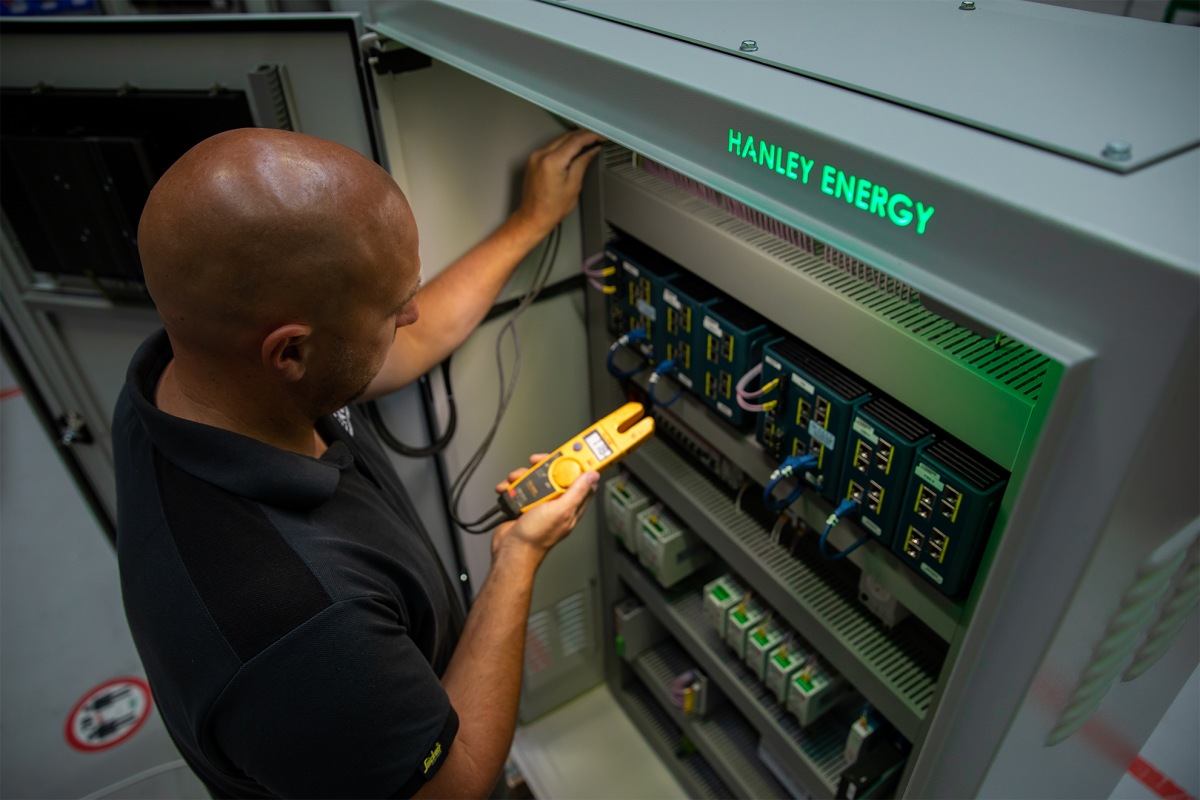Insights into Data Centre Investment & Market Growth
Data Centre Business News and Industry Trends
Data Centre Compliance: Standards, Risk & Governance
Insights into Data Centre Investment & Market Growth
BCS Consultancy appoints new COO
BCS Consultancy, a global data centre consultancy, has appointed Chris Coward as its new Chief Operating Officer following the departure of co-founder Scott Shearer after ten years with the business.
Chris steps into the role as BCS says it continues to grow internationally and expand its work with customers across the data centre lifecycle.
Chris joined BCS in 2017 as one of its earliest employees. Over the past eight years he has worked with founders James Hart and Scott Shearer as the company expanded from a small UK-based consultancy to a global business with more than 165 specialists across five international offices.
During that period, BCS has supported more than 300 projects, advised on over £20 billion of investment, and generated annual revenue in excess of £22 million.
Chris has led the development of the company’s project management capability and helped build its talent pipeline, including launching an apprenticeship programme designed to address skills shortages within the data centre sector.
BCS says Chris will help guide the company through its current phase of overseas expansion, focusing on strengthening internal operations, supporting digital adoption, and maintaining a customer-first culture.
New leadership during a global growth phase
Commenting on his appointment, Chris says, “I’ve had the privilege of working closely with James and Scott for much of my career, and want to thank them both for their leadership and trust, which have shaped both my journey and the culture of BCS.
"As BCS becomes an increasingly global business, my primary focus is to ensure we have the right operational structure, technology, and support in place to deliver consistently for our clients while staying true to the ethos that makes BCS different.”
BCS reports that demand for data centre expertise remains strong. According to the company's Q4 Data Centre Commercial Report, 92% of surveyed professionals expect continued sector growth through 2026. However, the report also highlights challenges such as increased AI-driven workloads, skills shortages, power and supply chain constraints, and the need for more resilient infrastructure.
BCS states that Chris’s appointment reflects its commitment to supporting customers entering the AI era and strengthening operational capability as the company continues to expand internationally.
Joe Peck - 8 January 2026
Data Centre Business News and Industry Trends
Data Centre Infrastructure News & Trends
Innovations in Data Center Power and Cooling Solutions
Insights into Data Centre Investment & Market Growth
Schneider Electric names new VP
Global energy technology company Schneider Electric has appointed Matthew Baynes as Vice President of its Secure Power and Data Centre division for the UK and Ireland.
Matthew takes up the role as both countries see rapid growth in digital infrastructure investment, driven by rising demand from artificial intelligence workloads, accelerated data centre construction, and government-backed initiatives.
Experience across data centre leadership
Matthew has worked in Schneider Electric’s data centre business for nearly 20 years. His most recent position was Global Vice President for Strategic Partners and Cloud and Service Providers, where he led a global team supporting colocation, cloud, and hyperscale customers.
Earlier roles included Global Colocation Segment Director, where he launched the company’s first multi-country account programme, now established as a core element of its global approach.
Matthew has also held senior leadership positions in the UK and Ireland since Schneider Electric acquired APC in 2007 and worked for several years in the Netherlands supporting European operations.
Alongside his corporate responsibilities, Matthew has contributed to industry bodies including techUK and the European Data Centre Association, supporting policy engagement and sustainability initiatives.
Commenting on his appointment, Matthew says, “The UK is one of Europe’s most important and vibrant digital infrastructure hubs and, with AI accelerating demand, the next few years present a major opportunity to strengthen its global leadership position.
"At the same time, Ireland continues to play a critical role in the region’s digital ecosystem, with its data centre market serving key customers globally.
“Data centres are engines for jobs and competitiveness, supporting growth that benefits the digital economy, local communities, and empowering innovation. This is a pivotal moment to shape their role in the UK and Ireland’s digital future, and I’m delighted to accept this new role at such a crucial time.”
Pablo Ruiz-Escribano, Senior Vice President for the Secure Power and Data Centre division in Europe, adds, “Matthew’s deep experience in global strategy and both local and regional execution makes him uniquely positioned to lead our Secure Power business in the UK and Ireland during this critical period of growth.”
Matthew assumes the role with immediate effect.
For more from Schneider Electric, click here.
Joe Peck - 7 January 2026
Data Centre Build News & Insights
Data Centre Business News and Industry Trends
Data Centre Projects: Infrastructure Builds, Innovations & Updates
Insights into Data Centre Investment & Market Growth
Global data centre build-out projected to require $3tn
The global data centre sector is poised for continued unprecedented expansion, with capacity expected to nearly double from 103 GW to 200 GW by 2030, according to real estate and investment management company JLL’s newly released 2026 Global Data Center Outlook report.
Artificial intelligence is rapidly reshaping the data centre landscape, and JLL anticipates AI workloads will represent half of all data centre capacity by 2030. Despite rapid growth, the fundamentals for the sector remain healthy and property metrics do not point to a bubble.
The explosive growth will require up to $3 trillion (£2.2 trillion) in total investment over the next five years, including $1.2 trillion (£887 billion) in real estate asset value creation and approximately $870 billion (£643 billion) in new debt financing, marking an infrastructure investment supercycle.
“We’re witnessing the most significant transformation in data centre infrastructure since the original cloud migration,” notes Matt Landek, Global Division President, Data Centers and Critical Environments at JLL. “The sheer scale of demand is extraordinary. Hyperscalers are allocating $1 trillion (£739 billion) for data centre spend between 2024 and 2026 alone, while supply constraints and four-year grid connection delays are creating a perfect storm that’s fundamentally reshaping how we approach development, energy sourcing, and market strategy.”
AI drives transformation
AI workloads could represent 50% of all data centre capacity by 2030, compared to approximately 25% in 2025. JLL anticipates a critical inflection point in 2027 when AI inference workloads will overtake training as the dominant requirement.
“We’re witnessing the emergence of an entirely new infrastructure paradigm where AI training facilities demand 10x the power density and command 60% lease rate premiums over traditional data centres,” explains Andrew Batson, Global Head of Data Center Research at JLL. “Beyond the economics, AI has become a matter of national strategic importance, driving countries to develop domestic capabilities through sovereign infrastructure investments that represent an $8 billion (£6 billion) CapEx opportunity by 2030.”
AI chips are projected to grow their total revenue share from 20% to 50% of the semiconductor market by 2030, with custom silicon expected to capture 15% market share as hyperscalers develop their own processors. The future could include emerging technologies like neuromorphic computing for ultra-efficient inference tasks that could reduce infrastructure demands and enable data centres to be more power-efficient.
Regional growth patterns
The Americas will maintain its position as the largest data centre region, representing about 50% of global capacity and achieving the fastest growth rate through 2030. The Asia-Pacific (APAC) region is projected to expand from 32 GW to 57 GW, while Europe, the Middle East, and Africa (EMEA) will add 13 GW of new supply.
Each region faces distinct market dynamics that will shape development strategies. In APAC, colocation is leading growth, while on-premise capacity is projected to decline 6% as enterprises continue cloud migration. EMEA’s growth forecast is fuelled by strong demand from hyperscalers, with growth concentrated in established European hubs like London, Frankfurt, and Paris, alongside emerging Middle Eastern markets pursuing digital transformation strategies. The US continues to drive most activity in the Americas, accounting for about 90% of regional capacity.
Market fundamentals remain strong
Property metrics do not indicate a bubble, as JLL’s analysis indicates the sector maintains healthy fundamentals with 97% global occupancy and 77% of the construction pipeline pre-committed to tenants.
Global lease rates are forecast to increase at a 5% CAGR through 2030, with the Americas leading at 7% annual growth due to severe supply constraints.
Despite developers preordering materials up to 24 months in advance, more than half of projects in 2025 experienced construction delays of three months or more. The average equipment lead time globally is now 33 weeks, a 50% increase from pre-2020 levels. The industry is responding through modular construction solutions, with annual sales of modular systems and micro data centres projected to reach $48 billion (£35 billion) by 2030.
“The increase in equipment lead times is affecting APAC just as it is globally, but strong pre-commitment levels demonstrate continued confidence in the market,” says Glen Duncan, JLL Data Center Research Director, Asia Pacific.
Energy and sustainability challenges
Energy sourcing remains a critical challenge, with average grid connection lead times exceeding four years in primary markets. Due to utility interconnection delays and mounting pressure from rising grid electricity costs, some operators are moving to directly fund their own energy generation, and several markets have implemented de facto 'bring your own power' mandates, including Dublin and Texas.
Data centres are also adopting diverse regional energy strategies to address grid constraints. Natural gas is projected to play a major role in alleviating grid constraints in the US, both for temporary bridge power and increasingly for permanent on-site power generation. The four primary hyperscalers are already fully matching their US data centre portfolios with renewable energy. In EMEA, projects combining renewables and private wire transmission can reduce the cost of power for tenants by 40% compared to the grid.
Battery energy storage systems (BESS) are gaining momentum, enabling cost-effective handling of short-duration outages and positioning the technology as a dynamic grid asset to speed up interconnection timelines. Additionally, solar-plus-storage will become a key component of global data centre energy strategies by 2030, with renewable energy costs projected to outcompete fossil fuels across all major regions.
“As regulatory and stakeholder expectations around renewable energy sourcing increase globally, data centre operators will face heightened scrutiny over their energy procurement,” suggests Martin Jensen, EMEA Division President, Data Centers at JLL. “While renewables like solar and wind remain the dominant focus of clean energy strategies, power sources such as nuclear are gaining attention for their ability to provide reliable electricity and help balance sustainability requirements with operational continuity; however, significant new nuclear capacity is unlikely to be widely deployed before the 2030s.”
Capital markets evolution
The sector is experiencing significant capital markets maturation, with core investment strategies now representing 24% of fundraising activity, up from less than 10% previously. More than $300 billion (£221 billion) in global M&A activity has occurred since 2020, though future investment is expected to shift towards recapitalisations and joint ventures as the market matures.
Global data centre core fund capital formation could top $50 billion (£37 billion) in 2026, with strategies targeting returns of 10% or more. ABS and CMBS securities are quickly becoming a solution for financing rapid sector expansion, with issuance volumes roughly doubling every year since 2020 and projected to reach $50 billion (£37 billion) in 2026.
For more from JLL, click here.
Joe Peck - 6 January 2026
Data Centre Business News and Industry Trends
Data Centre Infrastructure News & Trends
Innovations in Data Center Power and Cooling Solutions
Insights into Data Centre Investment & Market Growth
Jabil acquires Hanley Energy Group
Jabil, a US provider of electronics manufacturing and supply chain services, has completed the acquisition of Hanley Energy Group, a provider of energy management and critical power systems for the data centre infrastructure market.
The transaction was completed on 2 January 2026 and was valued at approximately $725 million (£536 million), with contingent consideration of up to $58 million (£42.8 million) linked to future revenue targets.
The acquisition was completed as an all-cash transaction. TM Capital acted as exclusive financial adviser to Hanley Energy Group, while UBS Investment Bank advised Jabil.
A focus on data centre power management
Jabil says the acquisition is intended to strengthen its capabilities in data centre power management, particularly as demand increases from artificial intelligence workloads.
Hanley Energy Group operates across 13 locations globally - with headquarters in Stamullen, Ireland, and in Ashburn, Virginia, USA - employing around 850 staff.
Founded in 2009, Hanley Energy Group works across the design, supply, installation, and commissioning of power and energy management systems, supporting infrastructure from the grid through to the data centre rack. The company also provides lifecycle services, including maintenance and operational support.
Matt Crowley, Executive Vice President of Global Business Units, Intelligent Infrastructure at Jabil, comments, “We're excited to welcome Hanley Energy Group and their extensive expertise in power systems and energy optimisation to the Jabil team.
"Their know-how and capabilities complement Jabil’s existing power management solutions for data centres and will help us deploy and service them down to the rack level.”
Ed Bailey, Senior Vice President and Chief Technology Officer, Intelligent Infrastructure at Jabil, adds, “Data centre power management will only become more critical as hyperscalers ramp the availability of their AI technologies.
"This acquisition of Hanley Energy Group, coupled with our growing thermal management capabilities, aligns well with Jabil’s strategy to deliver custom solutions for the world’s AI leaders across the data centre lifecycle.”
Clive Gilmore, CEO of Hanley Energy Group, notes, “Joining forces with Jabil will supercharge our ability to deliver end-to-end, scalable, and energy-efficient solutions for the world’s most demanding data centre environments.
"Our customers will benefit from the expanded reach of Jabil’s global manufacturing footprint and supply chain, access to broader capabilities across the data centre lifecycle, and opportunities for sustainable growth to meet the evolving needs of AI hyperscalers.”
Dennis Nordon, Managing Director at Hanley Energy Group, concludes, “This is more than an acquisition; it’s a catalyst for the future of data centre power management. By joining with Jabil, we are positioned to lead the charge in delivering intelligent, sustainable solutions that empower hyperscalers to unlock the full potential of AI.”
Joe Peck - 6 January 2026
Data Centre Business News and Industry Trends
Insights into Data Centre Investment & Market Growth
News
VIRTUS Data Centres names new CEO
VIRTUS Data Centres, a UK data centre owner-operator and part of ST Telemedia Global Data Centres (STT GDC), today announced the appointment of Adam Eaton as Chief Executive Officer, effective immediately.
Under Adam’s leadership, VIRTUS says it will continue to "expand [its] portfolio of high-efficiency, sustainable data centres, building on a decade of rapid growth across the UK and Europe."
The company adds that it "remains committed to [its] vision to deliver world-class, energy-efficient infrastructure that supports the growth of the digital economy."
Bruno Lopez, President and Group CEO at STT GDC and Chairman at VIRTUS Data Centres, comments, “We are delighted to welcome Adam to VIRTUS at an exciting time.
"His insight and proven ability to scale complex operations make him the ideal leader for the business as VIRTUS continues to grow its footprint and strengthen its position as one of Europe’s leading data centre operators.
"We look forward to this new chapter of leveraging Adam’s knowledge, expertise, and stakeholder management skills for further growth across the business.”
Adam says, “I first met the VIRTUS team over 15 years ago. Since then, I’ve watched the company evolve into one of Europe’s leading data centre operators.
"Helping VIRTUS scale and support its next phase of growth is an exciting opportunity. I’m privileged to build on the foundations laid by the existing team, embracing one of the most exciting leadership roles in the industry today.”
Decades of experience
Adam brings a combination of commercial and operational expertise to VIRTUS. With over 20 years of experience spanning the data centre, cloud, and managed services sectors, he brings a track record of strategic leadership, business transformation, and operational performance.
Most recently, Adam served as Executive Group Director for Europe at Global Switch, where he led the business across the FLAPM (Frankfurt, London, Amsterdam, Paris and Madrid) markets and drove transformation plans to strengthen the business’ performance and scale.
Adam steps into the CEO role previously held by Thomas Ee, Group Chief Operating Officer of STT GDC, in an interim capacity for the past nine months.
For more from VIRTUS, click here.
Joe Peck - 6 January 2026
Data Centre Build News & Insights
Data Centre Business News and Industry Trends
Data Centre Projects: Infrastructure Builds, Innovations & Updates
Insights into Data Centre Investment & Market Growth
CapitaLand India Trust divests data centre stakes
CapitaLand India Trust (CLINT), a Singapore-listed business trust investing in data centres, IT parks, industrial facilities, and logistics across India, has entered into definitive agreements to divest 20.2% stakes in three data centre assets under development to CapitaLand India Data Centre Fund (CIDCF).
The transaction has an estimated total purchase consideration of ₹7.02 billion (S$99.73 million; £57.8 million). The consideration is based on 20.2% of the combined enterprise value of the three assets, amounting to ₹51.97 billion (S$738.2 million; £428.3 million) as of 31 December 2025.
This valuation will be adjusted for liabilities, working capital, and capital expenditure, and remains subject to post-completion adjustments.
According to the Trust, the agreed enterprise value was negotiated on a willing-buyer and willing-seller basis and represents a premium to the independent valuation of ₹45.70 billion (S$649 million; £376.6 million) as at 31 December 2025.
Details of the data centre assets
The three data centres included in the transaction are located in Mumbai, Chennai, and Hyderabad.
In Navi Mumbai, CapitaLand DC Mumbai consists of two towers in Airoli. Tower one is completed with an IT power capacity of 34MW and a gross capacity of 50MW, while tower two remains under development with planned capacities of 37MW IT and 55MW gross.
CapitaLand DC Chennai, located in Ambattur, is under development and is expected to provide 34MW of IT capacity and 53MW of gross capacity.
CapitaLand DC Hyderabad, situated in Madhapur, is also under development, with planned capacities of 27MW IT and 42MW gross.
In September 2025, CLINT divested CyberVale in Chennai and CyberPearl in Hyderabad, marking the Trust’s first divestment since its listing in 2007. The partial divestment of its data centre portfolio follows this earlier transaction and forms part of what CLINT describes as its broader approach to managing and realising the value of its development assets.
Commenting on the transaction, Gauri Shankar Nagabhushanam, Chief Executive Officer of CapitaLand India Trust Management, the trustee-manager of CLINT, says, “The partial divestment reflects continued execution of our portfolio reconstitution strategy.
"By unlocking value earlier in the development cycle while retaining a significant stake in the assets, we are able to support our development pipeline and enhance financial flexibility.
“We are pleased to be partnering with CIDCF and remain invested in the future growth of India’s data centre sector through our remaining stake in the portfolio.
"The partnership with CIDCF also provides CLINT the right to participate in a partial stake in future data centre developments by our sponsor and potentially buy back the assets or explore exit options such as an initial public offering of the assets.
"Post-transaction, CLINT remains well-positioned to pursue accretive and higher yielding investment growth opportunities in key Indian cities to create value for our Unitholders.”
Joe Peck - 2 January 2026
Data Centre Build News & Insights
Data Centre Business News and Industry Trends
Data Centre Projects: Infrastructure Builds, Innovations & Updates
Insights into Data Centre Investment & Market Growth
AirTrunk expands Japan's hyperscale data centre capacity
Australian hyperscale data centre operator AirTrunk has announced plans to develop a second hyperscale data centre in Osaka, expanding its platform in Japan and increasing total national capacity to around 530 MW.
The new facility, OSK2, will be located in East Osaka and is planned to deliver up to 100 MW of IT capacity. It will complement AirTrunk’s existing OSK1 site in West Osaka, which provides 20 MW, adding regional diversity across the Kansai area.
The development forms part of a wider investment programme of approximately $8 billion (£5.9 billion; ¥1.2 trillion) across AirTrunk’s existing and planned projects.
With OSK2, AirTrunk’s Japanese portfolio becomes part of a broader hyperscale platform spanning Asia Pacific and the Middle East. The company states that the new site is intended to support increasing demand linked to cloud adoption and AI workloads.
Investment in Osaka and national growth
OSK2 will be AirTrunk’s 14th data centre across six markets, contributing to a wider platform with more than two gigawatts of capacity from operational sites with secured power.
Since entering Japan, AirTrunk has invested around $1.57 billion (£1.1 billion; ¥244 billion) to support construction activity, operational roles, and local supply chains.
Robin Khuda, founder and CEO of AirTrunk, says, “Japan plays a pivotal role in AirTrunk’s platform growth across Asia-Pacific. As Japan’s cloud and AI adoption accelerates, our continued investment in Osaka and Tokyo reflects our long-term commitment to building the scalable infrastructure that underpins this transformation.
"Japan is not only a key market for us, but a partner in shaping the future of hyperscale and AI innovation. AirTrunk’s Japan investment is one of the largest investments by an Australian company and brings Australia closer to Japan.”
The company recently opened a new Japan headquarters in Roppongi Hills Mori Tower, expanding office space to accommodate team growth. AirTrunk currently employs more than 100 staff in Japan and says it plans to increase headcount to support ongoing development.
Nori Matsushita, AirTrunk Country Head, Japan, adds, “OSK2 represents a significant milestone in our commitment to Japan. By expanding in Osaka, we’re not only meeting the growing demand for hyperscale and AI infrastructure, but also creating new opportunities for local talent, suppliers, and communities.
"This investment strengthens Japan’s position as a digital leader in Asia-Pacific and ensures our customers have the resilient, scalable capacity they need to innovate.”
Japan’s national digital initiatives, including Society 5.0 and the Priority Plan for Digital Society, place cloud and AI infrastructure at the centre of economic and social development. AirTrunk says its expansion is aligned with these programmes by increasing available hyperscale capacity within the country.
Yamada Kenji, Member of the House of Representatives and State Minister of Economy, Trade, and Industry, notes, “Japan is committed to building a robust digital foundation that accelerates innovation and strengthens our global competitiveness.
"Continued investments like AirTrunk’s new Osaka hyperscale data centre are vital to supporting our national priorities, including Society 5.0 and the responsible adoption of AI.
"By partnering with leading technology companies, we are ensuring that Japan remains at the forefront of sustainable digital infrastructure and economic growth.”
For more from AirTrunk, click here.
Joe Peck - 19 December 2025
Data Centre Build News & Insights
Data Centre Business News and Industry Trends
Data Centre Projects: Infrastructure Builds, Innovations & Updates
Insights into Data Centre Investment & Market Growth
InfraRed invests in Spanish data centre platform
InfraRed Capital Partners, an international mid-market infrastructure asset manager, has made a majority investment in NxN Data Centers, a Spain-based data centre platform focused on meeting growing demand for computing and data storage services.
NxN was formed in 2023 as a joint venture between Nethits Telecom Group and asset manager Adequita Capital. The platform is aimed primarily at regional enterprise customers and is developing facilities to support increasing requirements linked to digitalisation and AI-driven workloads.
InfraRed will invest alongside minority shareholder Adequita to support the development of NxN’s first site, a 5 MW data centre in Valencia, as well as potential expansion across the Iberian Peninsula.
Construction at the Valencia site has already started, with the facility scheduled to open in 2027. Once operational, it will provide colocation infrastructure designed to support high-density and AI-ready computing.
Expansion plans in an underserved market
Spain is attracting increased interest from data centre investors due to strong enterprise demand, data sovereignty considerations, and access to renewable energy. Despite this, the market remains relatively under-supplied compared with other European regions.
Pilar Banegas, Partner at InfraRed, comments, “NxN represents an opportunity to establish a data centre platform within Spain’s expanding digital landscape.
"We are pleased to be working with Adequita, whose experience and relationships across Spain will support the company’s development. We will also draw on our experience developing nexspace, our DACH data centre business, as we support the NxN management team.”
NxN’s leadership team brings experience across telecommunications, data centre operations, and enterprise services. The company says this background positions it to deliver its planned growth strategy in Spain.
Javier Salas, founder and Executive Chairman of Nethits and NxN Data Centers, says, “We are delighted to partner with InfraRed to deliver high-quality, energy-efficient data centres in Spain.
"By leveraging InfraRed’s experience in growing data centre businesses, we are well positioned to execute our vision for NxN.”
Josep Adsera, Principal at Adequita, adds, “We welcome InfraRed as the majority investor in NxN. Their investment reinforces the platform and enables it to move into its next phase of development. We look forward to continuing our collaboration.”
Joe Peck - 17 December 2025
Data Centre Build News & Insights
Data Centre Business News and Industry Trends
Data Centre Projects: Infrastructure Builds, Innovations & Updates
Insights into Data Centre Investment & Market Growth
Pure DC signs Europe’s largest hyperscale DC lease for 2025
Pure Data Centres Group (Pure DC), a designer, developer, and operator of hyperscale cloud and AI data centres, today announced it has signed 2025’s largest standalone hyperscale data centre lease in Europe.
A hyperscale customer is leasing the entire 78MW campus, situated in Westpoort, Amsterdam, with Pure DC investing over €1 billion (£877 million) to develop the site.
As part of the lease deal, Pure DC has purchased a site and secured planning permissions and 100MVA of power via a private substation. The land was purchased on a long leasehold from the Port of Amsterdam.
Securing the site, combined with permitting approvals, power, and supply constraints within Amsterdam, reportedly required complex negotiations and creative partnership over many months to secure the deal.
Regional growth and energy resilience
The company believes this infrastructure investment is set to play a pivotal role in supporting the region’s digital growth and energy resilience.
As well as the Euro investment by Pure DC, the development will provide over 1,000 jobs and support more roles through the extended supply chain. This hopes to drive demand for skilled positions, utilising local companies wherever possible.
Once complete, the data centre will provide approximately 80 permanent skilled jobs including engineers, maintenance, security, and administrative staff.
Designated AMS01, Pure DC’s data centre campus will comprise of three 85-metre towers, powered by a private substation with a firm connection into the 50kV grid.
Each of the three towers will house 26MW of data halls, designed to support high density compute with high efficiency cooling and to achieve the Netherlands energy efficiency target PUE of 1.2.
The private substation is already constructed and live, with development of the data halls expected to begin in January 2026.
Dame Dawn Childs, CEO of Pure Data Centres, says, “Amsterdam is one of Europe’s most constrained markets for digital infrastructure and Pure DC has again demonstrated its ability to unlock new, low-latency, high-quality capacity.
"This deal demonstrates how our specialist teams have the creativity and approach to deliver compelling proposals for even previously distressed assets - delivering solutions for local authorities, potential customers, and our supply chain.”
Pure DC says it is committed to working with local communities near current and future operational locations, noting that, in Amsterdam, it aims to replicate programs running in its other projects - including working with local schools and universities to provide training, career guidance, and outreach programs; supporting local charitable organisations; and working with community partners on environmental conservation projects.
For more from Pure DC, click here.
Joe Peck - 15 December 2025
Artificial Intelligence in Data Centre Operations
Data Centre Business News and Industry Trends
Data Centre Operations: Optimising Infrastructure for Performance and Reliability
Data Centre Regulations & UK Compliance Updates
Insights into Data Centre Investment & Market Growth
UK Chancellor urged to use AI for economic growth
UK Chancellor Rachel Reeves has been urged to use the opportunity afforded by AI to ‘Make Britain Great Again’.
The news comes as the Government announced that thousands of new AI jobs and billions of pounds of investment will be poured into the next parliament to help stimulate economic growth.
New AI Growth Zones
Amongst the package of measures proposed for the budget today include a new AI Growth Zone in South Wales, which will create more than 5,000 new jobs for local communities over the next decade, and a further £137 million to support key scientists to drive breakthroughs and develop new drugs, cures, and treatments.
Patrick Sullivan, CEO of think tank Parliament Street, argued that with limited options at the budget, only AI can ‘Make Britain Great Again’.
He claims, “With limited options due to Labour’s absurd manifesto pledge to rule out income tax rises, the Chancellor is now forced to cobble together a quick fix solution to fill a black hole which is entirely of her own making.
"However, the one saving grace is the advent of mass AI adoption, a technology that will bring mass savings at a time when the Government needs it most.
“This is Labour’s chance to show that it gets private enterprise and recognises that by supporting tech talent, AI can truly Make Britain Great Again.”
Tech expert Graeme Stewart, Head of Public Sector at Check Point Software, says, “The case for investing billions in AI to drive growth and reboot the economy is clear, yet little has been said about the cyber and regulatory risks associated with mass adoption.
“Whether it’s attacks on the NHS, nurseries, or local councils, cyber criminals have already proven that nothing in the public sector is off limits. That’s why it’s vital the Chancellor’s AI rollout is backed up with a robust action plan for protecting critical national infrastructure and minimising cyber risk.
"We also need to hear more about the Government’s plans to protect the public and private sector from the new wave of AI-enabled cyber-attacks, which require a cohesive national strategy.”
Graeme continues, “Mastering AI to drive growth is the right thing to do, but this approach must always go hand-in-hand with the necessary cyber strategy, to ensure the government stays one step ahead of the increasingly lethal cyber threat.”
Kenny MacAulay, CEO of Acting Office, a software platform for accounting practices, adds, “With businesses still reeling from the £25 billion National Insurance increase, the Chancellor has a tough task ahead to win the back trust from the private sector.
"Proposals for a nationwide AI rollout and investment in infrastructure can help kickstart economic growth, but only alongside a clear action plan to get businesses hiring again.
“The industry needs to embrace the opportunities that AI can bring, in terms of centralising technology investment and improving customer service.”
Joe Peck - 26 November 2025

Head office & Accounts:
Suite 14, 6-8 Revenge Road, Lordswood
Kent ME5 8UD
T: +44 (0)1634 673163
F: +44 (0)1634 673173









